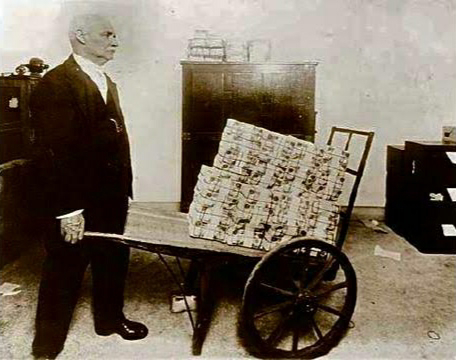Birth of Weimar Republic after First world war and how Germany suffered it's consequences
Germany, a powerful empire in the early years of the twentieth century, fought the First World War (1914-1918) alongside the Austrian empire and against the Allies (England, France and Russia). All joined the war enthusiastically hoping to gain from a quick victory. Little did they realise that the war would stretch on, eventually draining Europe of all its resources. Germany made initial gains by occupying France and Belgium. However the Allies, strengthened by the US entry in 1917, won , defeating Germany and the Central Powers in November 1918.The defeat of Imperial Germany and the abdication of the emperor gave an opportunity to parliamentary parties to recast German polity. A National Assembly met at Weimar and established a democratic constitution with a federal structure. Deputies were now elected tothe German Parliament or Reichstag, on the basis of equal and universal votes cast by all adults including women.This republic, however, was not received well by its own people largely because of the terms it was forced to accept after Germany's defeat at the end of the First World War. The peace treaty at Versailles with the Allies was a harsh and humiliating peace.
Germany lost its :
1.overseas colonies
2.a tenth of its population
3.13 per cent of its territories
4.75 per cent of its iron and 26 per cent of its coal to France, Poland, Denmark and Lithuania.
Germany after Versailles treaty, you can see in the map the parts of the territory that Germany lost after the Treaty.
The Allied Powers demilitarised Germany to weaken its power. The War Guilt Clause held Germany responsible for the war and damages the Allied countries suffered. Germany was forced to pay compensation amounting to £6 billion.
The Allied armies also occupied the resource-rich Rhineland for much of the 1920s. Many Germans held the new Weimar Republic responsible for not only the defeat in the war but the disgrace at Versailles.




Comments
Post a Comment